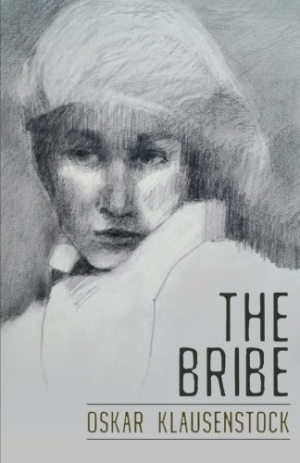The Bribe
Two main characters prove to be evocative letter writers, adept at setting scenes from decades past and schooled in the art of looking for meaning in horror.
From concentration camp survivor Oskar Klausenstock, author of The Prayer, comes an emotionally involved, powerful novel about two aging men straining for reconciliation and redemption across a seemingly unbridgeable divide. An exploration of the power of open dialogue which is both emotionally wrought and introspective, The Bribe is an exercise in hope well worth reading.
Nathan Klein is recovering from a stroke in a home for the elderly when he sees an old man on a bench whose face recalls the horrors of life in a Polish ghetto. Klein manages to deliver his old shtetl’s name to the man, whose visible consternation is all the proof Nathan needs: a creature from his nightmares has returned to haunt him.
But Gerhard Reichenberg is not exactly the monster Nathan’s memory has built him up to be. At the officious insistence of their mutual nurse, Miss Hedberg, the two men begin exchanging letters. “Miss Hedberg divides the human race into good men and bad men,” Nathan tells his new pen pal, and “you and I are good men.”
Though he’s doubtful that either he or the former Nazi can qualify for such commendations, the two build a trust around unadorned recollections of their time in Poland, centered on families lost and innocence rent. At the center of such stories stands a misused, disappeared girl named Esta, as well as the persistent question of how men become beasts: “how did [someone] like you become a thug in the first place?” Nathan poses. If there are any satisfactory answers available to such questions, these bravely sincere characters may be just the two to root them out.
Klausenstock is gifted at drawing out the visceral nature of both loss and aging. Before the introduction of Gerhard, Nathan spends his time reflecting on the indignities of losing one’s independence, and such passages are well executed, as are the letters that follow his encounter with Gerhard—including both the pleasantries natural to two men trapped in an unfortunate place and the stark recollections of days whose memories cannot be forgotten.
Though the title and cover material suggest that Gerhard’s ever-present desire for Esta will prove a center of the men’s exchanges, Nathan pleads ignorance of her early in the tale, and their exchanges progress with Esta excluded. Still, both characters prove to be evocative writers, adept at setting scenes from decades past and schooled in the art of looking for, if not always finding, meaning in horror.
If Miss Hedberg is a bit frustrating in her youthful refusals to attend to the pains of Nathan’s soul, she’s also an effective and amicable intermediary, and readers will find it difficult not to invest in her the same admiration that Nathan and Gerhard do. Her interferences help to move the story along, even when her charges are ready to consider forgiveness an impossible task.
Indeed, the overarching tone is more hopeful than is typical of novels that explore the themes found in The Bribe, but the exchanges between the men are written with enough depth to make readers want to believe. Gerhard’s hope of finding Esta is replaced, perhaps too quickly, with a desire to hold onto an understanding ear, but both men work toward a sympathetic and satisfying conclusion.
Reviewed by
Michelle Anne Schingler
Disclosure: This article is not an endorsement, but a review. The publisher of this book provided free copies of the book and paid a small fee to have their book reviewed by a professional reviewer. Foreword Reviews and Clarion Reviews make no guarantee that the publisher will receive a positive review. Foreword Magazine, Inc. is disclosing this in accordance with the Federal Trade Commission’s 16 CFR, Part 255.

